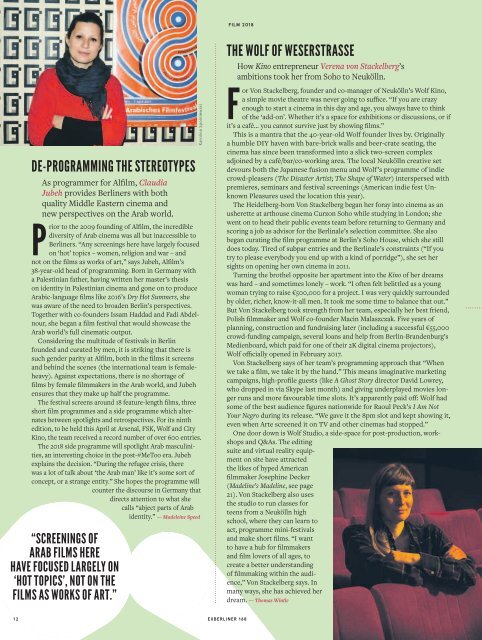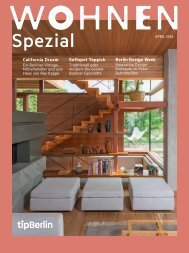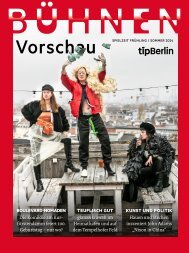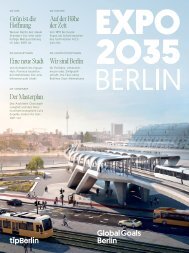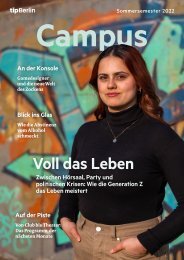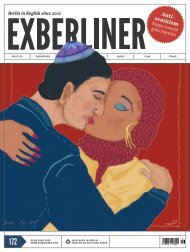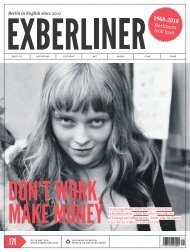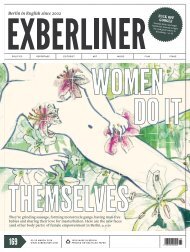EXBERLINER Issue 168, February 2018
You also want an ePaper? Increase the reach of your titles
YUMPU automatically turns print PDFs into web optimized ePapers that Google loves.
FILM <strong>2018</strong><br />
DE-PROGRAMMING THE STEREOTYPES<br />
As programmer for Alfilm, Claudia<br />
Jubeh provides Berliners with both<br />
quality Middle Eastern cinema and<br />
new perspectives on the Arab world.<br />
Prior to the 2009 founding of Alfilm, the incredible<br />
diversity of Arab cinema was all but inaccessible to<br />
Berliners. “Any screenings here have largely focused<br />
on ‘hot’ topics – women, religion and war – and<br />
not on the films as works of art,” says Jubeh, Alfilm’s<br />
38-year-old head of programming. Born in Germany with<br />
a Palestinian father, having written her master’s thesis<br />
on identity in Palestinian cinema and gone on to produce<br />
Arabic-language films like 2016’s Dry Hot Summers, she<br />
was aware of the need to broaden Berlin’s perspectives.<br />
Together with co-founders Issam Haddad and Fadi Abdelnour,<br />
she began a film festival that would showcase the<br />
Arab world’s full cinematic output.<br />
Considering the multitude of festivals in Berlin<br />
founded and curated by men, it is striking that there is<br />
such gender parity at Alfilm, both in the films it screens<br />
and behind the scenes (the international team is femaleheavy).<br />
Against expectations, there is no shortage of<br />
films by female filmmakers in the Arab world, and Jubeh<br />
ensures that they make up half the programme.<br />
The festival screens around 18 feature-length films, three<br />
short film programmes and a side programme which alternates<br />
between spotlights and retrospectives. For its ninth<br />
edition, to be held this April at Arsenal, FSK, Wolf and City<br />
Kino, the team received a record number of over 600 entries.<br />
The <strong>2018</strong> side programme will spotlight Arab masculinities,<br />
an interesting choice in the post-#MeToo era. Jubeh<br />
explains the decision. “During the refugee crisis, there<br />
was a lot of talk about ‘the Arab man’ like it’s some sort of<br />
concept, or a strange entity.” She hopes the programme will<br />
counter the discourse in Germany that<br />
directs attention to what she<br />
calls “abject parts of Arab<br />
identity.” — Madeleine Speed<br />
“SCREENINGS OF<br />
ARAB FILMS HERE<br />
HAVE FOCUSED LARGELY ON<br />
‘HOT TOPICS’, NOT ON THE<br />
FILMS AS WORKS OF ART.”<br />
Karolina Spolniewski<br />
THE WOLF OF WESERSTRASSE<br />
How Kino entrepreneur Verena von Stackelberg’s<br />
ambitions took her from Soho to Neukölln.<br />
For Von Stackelberg, founder and co-manager of Neukölln’s Wolf Kino,<br />
a simple movie theatre was never going to suffice. “If you are crazy<br />
enough to start a cinema in this day and age, you always have to think<br />
of the ‘add-on’. Whether it’s a space for exhibitions or discussions, or if<br />
it’s a café... you cannot survive just by showing films.”<br />
This is a mantra that the 40-year-old Wolf founder lives by. Originally<br />
a humble DIY haven with bare-brick walls and beer-crate seating, the<br />
cinema has since been transformed into a slick two-screen complex<br />
adjoined by a café/bar/co-working area. The local Neukölln creative set<br />
devours both the Japanese fusion menu and Wolf’s programme of indie<br />
crowd-pleasers (The Disaster Artist; The Shape of Water) interspersed with<br />
premieres, seminars and festival screenings (American indie fest Unknown<br />
Pleasures used the location this year).<br />
The Heidelberg-born Von Stackelberg began her foray into cinema as an<br />
usherette at arthouse cinema Curzon Soho while studying in London; she<br />
went on to head their public events team before returning to Germany and<br />
scoring a job as advisor for the Berlinale’s selection committee. She also<br />
began curating the film programme at Berlin’s Soho House, which she still<br />
does today. Tired of subpar entries and the Berlinale’s constraints (“If you<br />
try to please everybody you end up with a kind of porridge”), she set her<br />
sights on opening her own cinema in 2011.<br />
Turning the brothel opposite her apartment into the Kino of her dreams<br />
was hard – and sometimes lonely – work. “I often felt belittled as a young<br />
woman trying to raise €500,000 for a project. I was very quickly surrounded<br />
by older, richer, know-it-all men. It took me some time to balance that out.”<br />
But Von Stackelberg took strength from her team, especially her best friend,<br />
Polish filmmaker and Wolf co-founder Macin Malaszczak. Five years of<br />
planning, construction and fundraising later (including a successful €55,000<br />
crowd-funding campaign, several loans and help from Berlin-Brandenburg’s<br />
Medienboard, which paid for one of their 2K digital cinema projectors),<br />
Wolf officially opened in <strong>February</strong> 2017.<br />
Von Stackelberg says of her team’s programming approach that “When<br />
we take a film, we take it by the hand.” This means imaginative marketing<br />
campaigns, high-profile guests (like A Ghost Story director David Lowrey,<br />
who dropped in via Skype last month) and giving underplayed movies longer<br />
runs and more favourable time slots. It’s apparently paid off: Wolf had<br />
some of the best audience figures nationwide for Raoul Peck’s I Am Not<br />
Your Negro during its release. “We gave it the 8pm slot and kept showing it,<br />
even when Arte screened it on TV and other cinemas had stopped.”<br />
One door down is Wolf Studio, a side-space for post-production, workshops<br />
and Q&As. The editing<br />
suite and virtual reality equipment<br />
on site have attracted<br />
the likes of hyped American<br />
filmmaker Josephine Decker<br />
(Madeline’s Madeline, see page<br />
21). Von Stackelberg also uses<br />
the studio to run classes for<br />
teens from a Neukölln high<br />
school, where they can learn to<br />
act, programme mini-festivals<br />
and make short films. “I want<br />
to have a hub for filmmakers<br />
and film lovers of all ages, to<br />
create a better understanding<br />
of filmmaking within the audience,”<br />
Von Stackelberg says. In<br />
many ways, she has achieved her<br />
dream. — Thomas Wintle<br />
12<br />
<strong>EXBERLINER</strong> <strong>168</strong>


